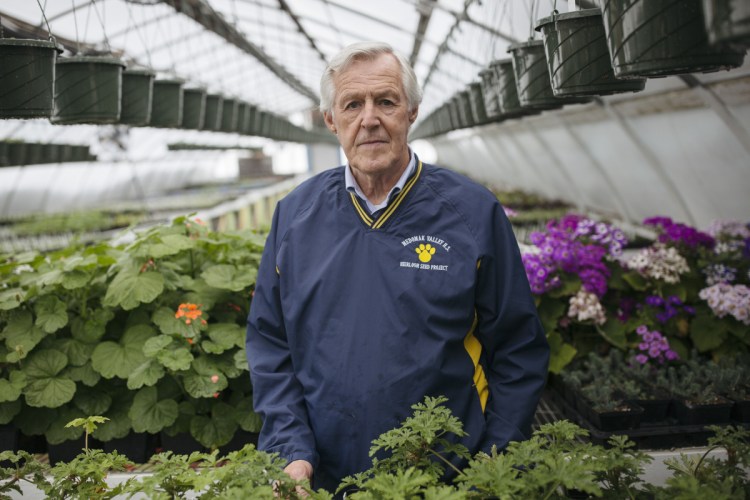Sometime around 1990, Waldoboro school teacher Neil Lash was watching the PBS program “The Victory Garden” when Kent Whealy appeared on the screen. Whealy had co-founded Seed Savers Exchange, one of the largest non-governmental seed banks in the United States and as he talked about the work they done with heirloom seeds, including some that had been brought to the United States on the Mayflower, Lash was struck by an inspiration.
At Medomak Valley High School, the science department had just merged with the horticulture program. Lash and Jon Thurston, then the department chair, were in charge of melding the two. They’d already been teaching their students about the frightening loss of biodiversity in the changing world.
“Instead of just talking about it,” Lash remembers, “we said, ‘Let’s do something about it.’ ”
Flash forward to 2018. Lash, 76, the winner of the Source Teacher Award, is not only still teaching, he’s about to renew his teaching certificate for another five years. The high school has a 2-acre garden, two greenhouses and a seed bank with about 1,000 different kinds of seeds and a national reputation. Make that international.
“Our seeds have basically gone all over the world,” Lash said. “We’ve sent seeds to the Nordic Seed Bank in Sweden and to Taiwan.”
The Source Award is not the first time Lash’s work has been recognized, by any means. In 2017 he received a National Award of Excellence from the National Garden Clubs, and in 2015, his students won a $20,000 grant from Seeds of Change, an organic seed company (they used the money to buy a new walk-in freezer to store the precious seeds). In early May, a film crew from John’s Hopkins University’s Center for a Livable Future will come to Waldoboro to shoot footage for a documentary about sustainability and food systems.
He’s also well admired by his peers in the seed-saving world.
“It is an incredible contribution,” said Gary Nabhan, a pioneer in the seed-saving movement who holds a chair in food and security at the University of Arizona. When he met Lash, he was so excited, he said, “It was probably like when people met Elvis Presley or Bruce Springsteen.”
Lash’s work on the history of seeds and crops such as the Waldoboro Green Neck turnip (Nabhan included a chapter on the turnip in one of his books) has served multiple functions, Nabhan said. He’s enriched historical records, and used plants as the springboard to teach nutrition, political and environmental history and of course, biology. But most important, he’s imparted enthusiasm.
“The really important thing about this is having kids excited about it,” Nabhan said. “So when they get their own farm or home or little piece of land that they keep these things going. It is really as much about humanities as it is science.”
Not long after Lash started the program, Will Bonsall, a Maine farmer and significant seed saver and curator himself, started receiving letters from Medomak Valley High students “asking for this or that variety,” Bonsall said. “And they show real enthusiasm, as if it not just to get a grade or something. He is obviously imparting something.”
“I think the main qualification in any teacher, aside from curriculum, is that they need to be passionate,” Bonsall added. For Lash, the list of his passions includes history, seeds and teaching itself.
Lash’s interest in history led him to start an arboretum at the school with trees that have some historical connection, many of them descendants of so-called “witness trees,” that were present at historical events. He recently planted a spruce seedling, for instance, that came from a property once owned by Civil War Brevet Brigadier Gen. Ellis Spear in Friendship.
Lash has also carved out a specialty for the Medomak Valley High School Seed Bank – rare Native American seeds – that has a little something to do with his own roots. “I’m part Choctaw Indian,” he said. Recently, the seed bank has shared Rhode Island Red Cap Flint Corn with the Koasek Abenaki tribe in Vermont.
When he first envisioned the program, Lash said, he had no sense of what it would turn into, and that is an approach he recommends to other teachers. “You can’t start with this big vision.” No? He himself couldn’t have imagined what it would become, mainly because he hadn’t anticipated the impact of sharing.
“We started with four seeds,” Lash said. “They had local historical connections, and from there, we started sharing and off it went.”
“Every seed has a story to tell,” he added. And his students are listening.
Mary Pols can be contacted at 791-6456 or at:
Twitter: MaryPols
Copy the Story LinkSend questions/comments to the editors.




Success. Please wait for the page to reload. If the page does not reload within 5 seconds, please refresh the page.
Enter your email and password to access comments.
Hi, to comment on stories you must . This profile is in addition to your subscription and website login.
Already have a commenting profile? .
Invalid username/password.
Please check your email to confirm and complete your registration.
Only subscribers are eligible to post comments. Please subscribe or login first for digital access. Here’s why.
Use the form below to reset your password. When you've submitted your account email, we will send an email with a reset code.